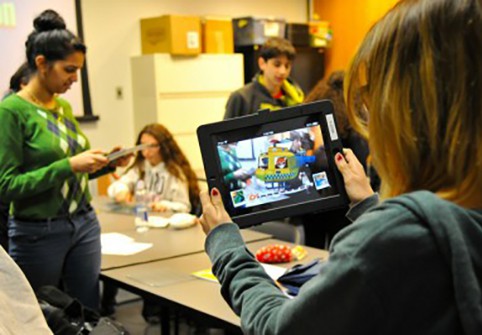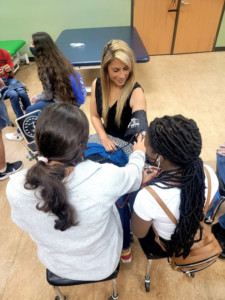Leveraging Innovative Policy Options for Students

Jamey Fitzpatrick
Imagine being an eighth grade student living in a small rural Midwest community with a passion to become a marine biologist taking an online course in Oceanography from a school, college, university or private provider located in Maine with national experts. Imagine being a 12th grade student from a large urban school with a desire to study Gaelic culture and language with an educational institution in Ireland. These examples are not science fiction; the ability to personalize learning has never been easier and more cost effective.
When I attended public education, there were limited options available to most families regarding school choice. While growing up in the “system,” students gave little thought about being able to pick school A, B or C. The idea of attending a public school and selecting individual classes from multiple providers located outside of the community was even more foreign. Technology, innovation and powerful shifts in state-level polices have created a new landscape of opportunity for K-12 students in the U.S.
This changing landscape has also established an unprecedented need for increased consumer awareness for parents. A growing number of states allow K-12 students and their parents to “unbundle” their public education experience and explore targeted learning options that are free of traditional time and place barriers. I believe parental awareness of these innovative polices is as important as the policy itself.
Research has shown online learning is academically effective and can provide meaningful alternatives for students who have a need for greater flexibility with their education due to individual learning styles, health conditions, employment responsibilities, lack of success with traditional school environments, or desire to be working early at the college level. However, expanded choice alone will not help every student achieve academic success.
Educators and parents are beginning to recognize that achieving success as an online learner has become an important part of being college and career ready. As the system of public education works to scale the effective use of new and innovative delivery models, various stakeholders have important roles to play including:
Parents play a central role in being a strong advocate for their child and need to be assertive in requesting alternative educational options, especially when local school personnel are not particularly supportive of online delivery models. Parents and guardians also play an extremely important role in helping their student decide if online learning is the most effective way for him/her to learn.
Schools take on a huge responsibility to vet the quality of online course providers and offer effective wrap around mentoring, counseling and support services to help students be successful in online learning environments. School mentors are critical partners in ensuring student success in navigating the virtual learning journey.
Policy leaders need to support public awareness campaigns so that more students and parents are familiar with innovative policies designed to expand choice and offer personalized educational options. Policy makers also need to establish appropriate mechanisms that provide transparency on the costs, effectiveness and quality of online providers, without hampering innovation.
Online Course Providers: play a key role in helping to support students, parents and school administrators in several capacity building areas related to consumer awareness and best practices. For example, Michigan Virtual University has recently published three important resources:
- Mentor Fundamentals: A Guide to Mentoring Online Learners describes the roles and responsibilities of the school mentor and contains tools to prepare mentors for working with online learners. The guide’s resources include defining the characteristics of a good mentor, mentor best practices and an Online Learner Readiness Rubric.
- A Parent Guide to Online Learning is for parents, guardians, counselors, and others who want to help students decide whether online courses are a good option of them. The guide includes important definitions, an overview of online learning policies, a profile of successful students, advice for parents, and a readiness checklist, and identifies how online learning can be used to support Next Generation learning models.
- Online Education: A Consumer Awareness Report is specifically designed to inform parents, school personnel, and school board members of the nature of online learning options, their effectiveness for Michigan students, the costs of these programs, and current trends.
In addition to the above mentioned resources, MVU also operates the Michigan Virtual Learning Research Institute. The role of the Institute is to expand Michigan’s capacity to support new learning models, engage in active research to inform new policies in online and blended learning, and strengthen the state’s infrastructures for sharing best practices.
Schools are beginning to embrace the macro level trend of unbundling educational services. It will become increasingly important for school personnel to help students and their parents design, implement and manage personal learning plans that include educational services provided by a third party, such as another school, higher education institution, private company or non-profit organization. Parents will continue to play a vital advocacy role in maneuvering this changing landscape as they take steps to ensure their voices are heard.
This blog is part of our Smart Parents Series in partnership with the Nellie Mae Education Foundation. We would love to have your voice in the Smart Parents conversations. To contribute a blog, ask a question, or for more information, email Bonnie Lathram with the subject “Smart Parents.” For more information about the project see Parents, Tell Your Story: How You Empower Student Learning as well as other blogs:
- Early Childhood Education is Critical for our Own Kids’…and the Nation’s
- If Ever There Was a Kid Born to Read
- The Power of Personal Relationship in Personalized Learning
 Jamey Fitzpatrick serves as the President and CEO of Michigan Virtual University (MVU). MVU is a private, nonprofit Michigan corporation established in 1998. It is the parent organization of the Michigan Virtual School, Michigan LearnPort and Michigan Virtual Learning Research Institute.
Jamey Fitzpatrick serves as the President and CEO of Michigan Virtual University (MVU). MVU is a private, nonprofit Michigan corporation established in 1998. It is the parent organization of the Michigan Virtual School, Michigan LearnPort and Michigan Virtual Learning Research Institute.







0 Comments
Leave a Comment
Your email address will not be published. All fields are required.